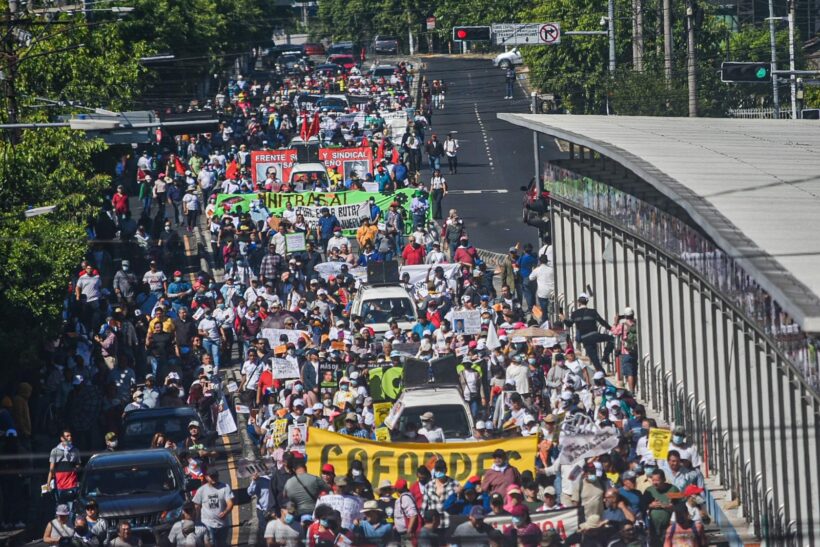31 years after the signing of the Chapultepec Peace Accords, hundreds of Salvadorans took to the streets to commemorate the date.
Far from being a mere act of remembrance, those mobilised expressed their firm rejection of the Regime of Exception as part of the authoritarian practices installed by the government of Nayib Bukele.
The marchers also denounced how this measure, defended by the government for it to make a stand against gang violence, is being used to detain opposition social and trade union leaders.
On the other hand, the participants expressed their opposition to Bukele’s desire for presidential re-election, stating that “they represent the consolidation of a dictatorship”.
Among the participants in the demonstration was Oscar Ortíz, secretary general of the Farabundo Martí National Liberation Front Party (FMLN), who together with several activists laid a wreath on the wall in the park that commemorates the more than 75,000 victims of the war, including the dead and disappeared, according to Prensa Latina.
Likewise, the agency points out, “the Movement of Victims of the Regime (Movir) denounced the government for allegedly arresting innocent people and called on Salvadorans to “raise their voices for those who are afraid to speak out”.
Residents of the community of Santa Marta, where, according to Pressenza, social leaders were recently detained, demanded their immediate release at the March.
Silvia Urrutia, one of the leaders of the Bloque de Resistencia y Rebeldía Popular (BRP), another of the social organisations organising the march, said that in addition to its commemorative character, another objective of the demonstration is to denounce the democratic setbacks during the current government and demand the release of trade union leaders detained in recent days.
The Peace Accords were signed on 16 January 1992 between the government of El Salvador and the Farabundo Martí National Liberation Front (FMLN) in Chapultepec Castle, Mexico, putting an end to twelve years of civil war in the country.
The war pitted the armed guerrilla insurrection, supported by the peasant sectors, against the repression of the armed forces and the terrorism unleashed by the death squads, linked by the Truth Commission report to Roberto D’Aubuisson, former army major and founder of the right-wing ARENA party.
The civil war in El Salvador, as in neighbouring Guatemala, must be read in the context of the United States’ attempts to stem the revolutionary wave unleashed by the success of the Cuban revolution in 1959 and twenty years after the Sandinista revolution in Nicaragua in the face of the blatant social injustice and the popular exclusion of any possibility of democratic change.
On a more geopolitical level, the tension of the so-called “cold war” between the capitalist pole led by the Americans and the socialist bloc led at the time by the Soviet Union stands out.
The war, together with the prevailing conditions of poverty, produced a strong migratory exodus. Today, it is estimated that at least one in three Salvadorans live abroad, the majority of the diaspora in the United States.
The Peace Accords allowed the incorporation of leftist organisations into the country’s political life in a non-violent manner, and they managed to reach the country’s government in the 2009 and 2014 elections.
Although the FMLN governments brought social improvements and greater freedom of expression to the Salvadoran population, they did not succeed in reducing the criminal wave of gang violence, whose practices, codes and aesthetics reproduce a model similar to that of the gangs in the United States, which has also been adopted in other Central American countries.
The various forms of violence continue to be the predominant factor in El Salvador today, adopting characteristics of economic, physical and political violence, with women, the rural population and social organisations as the main targets.
However, as history shows, the way out of the tragedy will not be achieved with more repression, nor with the violation of human and social rights. In this context, it is worth celebrating the 1992 Peace Accords, which continue to mark the path towards a more humane country.






